Jesus’s death is not allegorical, since, His death is not a story told to explain truth. It IS the truth that needs to be explained. Jesus’s death was an historical fact which Dorothy Sayers referred to as “the only thing that ever really happened,1 …miraculous and unfathomable.”2 Steve Hindalong & Derald E. Daugherty picturesquely used words like mysterious and scandolous:
At the wonderful, tragic, mysterious tree
On a beautiful scandalous night, you and me
Were atoned by His blood and forever washed white
On a beautiful scandalous night
We have used the word motif to explain what happened on Calvary, but is this best? A motif, I am told, is “a distinctive feature or dominant idea with symbolic significance” but what is that dominant idea we are hoping to describe? That’s the quest. We know Jesus dealt effectively, completely, resolutely with the sin issue that separated us from a Holy God.3 We know we are forgiven.4 We know, thanks to Jesus’s death and resurrection, we have newness of life,5 a new birth,6 a new beginning in our relationship with God7 (and one another). We know that had Jesus not bleed and died on Calvary, none of these would have been true.8 We know if there had not been a Calvary, we would have died in sin9 and been relegated to a “lost” eternity.10
But some question why did He have to die—and specifically on a Roman cross—to provide all this. Does not God have the power and authority to provide our salvation another, less painful, way? When we consider God’s love for His Son, [Luke 3:22] it is not reasonable to assume that there was another way. His love for His Son would have provided that other way without blood. But the Scripture suggests there was no other way. As the writer of Hebrews confirmed “never without blood.” [Hebrews 9:7]
“Father, if you are willing, take this cup away from me — nevertheless, not my will, but yours, be done.”11
Calvary is not a parable. It is not a story to teach a moral truth. Jesus death was an historical reality that made possible God’s gift of eternal life. Calvary was not symbolic. Calvary was the execution of a Divine plan,12 a plan God carefully and thoughtfully drew up in eternity13 and executed through His obedient Son.14 Trying to understand the reasoning behind the Divine plan in story form is not what faith is about. Faith is accepting or recognizing that, through His death, Jesus offered us eternal life.15 [Acts 16:31]
A better question to ask might be: What really took place on Calvary? What happened when Jesus suffered and died? Or better still: What did Jesus’s death provide for us? (Leaving the “why” question to God, for now.)
The task of inspiration through the writing of the apostles and prophets was to share with us the event that God, in the person of His son, was going to die on a Roman cross and this single event would have eternal significance, It would become the moment by which all history would hereafter be interpreted and judged.
Our theology would have to present a new concept: Grace, a word unknown in ancient times. And, like the love that proclaimed it, requiring a faith that was open to comprehending the otherwise incomprehensible. Paul clarified, “…the person without the Spirit does not receive what comes from God’s Spirit, because it is foolishness to him; he is not able to understand it since it is evaluated [discerned] spiritually.”16
The title of this work asks “Why;” why did Jesus died on the Cross? But “why” is the endless question small children ask when they are caught doing something that mom and dad called “bad.” We don’t need to keep asking “why,” going deeper and deeper into a line of reasoning, hoping to spiral down into some mysterious eternal truth. [Deuteronomy 29:29] We’ll take a look at this central Truth, since, there are still mysteries associated with what Jesus accomplished on Calvary that sound the depths of a divine love for us that will require our glorification to grasp. John 3:16 reads “God so loved…” What kind of love is that? How big is His heart? Much of God’s provision through Christ remains to be experienced by us who only know now “in part,”17 a “downpayment”18 if you will, of a guaranteed heavenly experience yet to be fully embraced.
But instead of asking why let us study Jesus’s death from the perspective of the spiritual provisions which we can begin, in this life, to appropriate and appreciate. John in his epistle declared, “We know that we have passed from death to life because we love our brothers and sisters.”19 Let’s start there.
1 Dorothy Sayers. The Man Born to be King. (San Francisco CA: Ignatius Press. 1990) Page 290.
2 Dorothy Sayers. Creed or Chaos (Manchester,NH: Sophia Institute Press, 1974), Page. 8ff.
3 Colossians 1:22 But now he has reconciled you by his physical body through his death, to present you holy, faultless, and blameless before him
4 Ephesians 1:7 In him we have redemption through his blood, the forgiveness of our trespasses, according to the riches of his grace
5 Romans 6:5 For if we have been united with him in the likeness of his death, we will certainly also be in the likeness of his resurrection.
6 John 3:3 Jesus replied, “Truly I tell you, unless someone is born again, he cannot see the kingdom of God.”
7 1 John 1:2-3 that life was revealed, and we have seen it and we testify and declare to you the eternal life that was with the Father and was revealed to us what we have seen and heard we also declare to you, so that you may also have fellowship with us; and indeed our fellowship is with the Father and with his Son Jesus Christ.
8 Romans 5:9 How much more then, since we have now been declared righteous by his blood, will we be saved through him from wrath.
9 1 Corinthians 15:17 And if Christ has not been raised, your faith is worthless; you are still in your sins.
10 John 3:16 For God loved the world in this way: He gave his one and only Son, so that everyone who believes in him will not perish but have eternal life.
11 Luke 22:42
12 Isaiah 53:1 Who has believed what we have heard? [believed our report] And to whom has the arm of the LORD been revealed?
13 Matthew 25:34 Then the King will say to those on his right, ‘Come, you who are blessed by my Father; inherit the kingdom prepared for you from the foundation of the world.
14 Hebrews 5:8-9 Although he was the Son, he learned obedience from what he suffered. After he was perfected, he became the source of eternal salvation for all who obey him,
15 John 14:1 Don’t let your heart be troubled. Believe in God; believe also in me.
16 1 Corinthians 2:14
17 1 Corinthians 13:12 Now I know in part, but then I will know fully
18 1 Corinthians 5:5 Now the one who prepared us for this very purpose is God, who gave us the Spirit as a down payment.
19 1 John 3:14

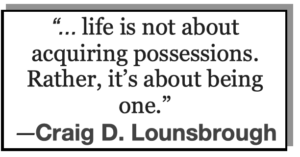 Jesus gave Himself, His crucifixion was voluntary. As He said, “No one takes it from me, but I lay it down on my own. I have the right to lay it down, and I have the right to take it up again. I have received this command from my Father.” (John 10:18) And He did this “for us.” This is not only voluntary but vicarious.
Jesus gave Himself, His crucifixion was voluntary. As He said, “No one takes it from me, but I lay it down on my own. I have the right to lay it down, and I have the right to take it up again. I have received this command from my Father.” (John 10:18) And He did this “for us.” This is not only voluntary but vicarious.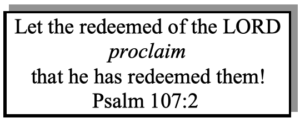 But not just a servant to God, but a “pure” or cleansed (from sinful thoughts and motives) servant of God; we serve no other lord. There is implied here no other motive or personal interest other than pleasing our Lord.
But not just a servant to God, but a “pure” or cleansed (from sinful thoughts and motives) servant of God; we serve no other lord. There is implied here no other motive or personal interest other than pleasing our Lord.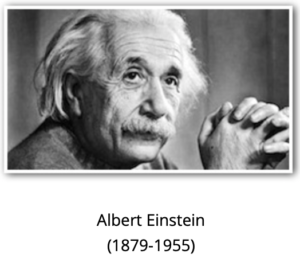
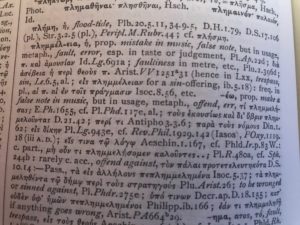
 We “kind-of” get the message that God’s Eden is still on His mind where—before that fatal bite—all was in harmony…..
We “kind-of” get the message that God’s Eden is still on His mind where—before that fatal bite—all was in harmony…..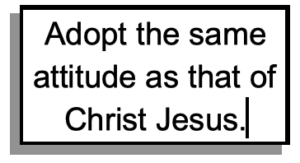 The Context
The Context The anxiety here is the greek word meteorizesthe which, says Professor Lange, “echoes also in our [word] ‘Meteor.’” Meteors are known for their fiery entry into our atmosphere on their momentous fall to earth. Luke’s use of this term, to restate Augustine, “breaks the bounds of ordinary grammar” and sets forth in metaphor a profound truth. Lange explains,
The anxiety here is the greek word meteorizesthe which, says Professor Lange, “echoes also in our [word] ‘Meteor.’” Meteors are known for their fiery entry into our atmosphere on their momentous fall to earth. Luke’s use of this term, to restate Augustine, “breaks the bounds of ordinary grammar” and sets forth in metaphor a profound truth. Lange explains,  “Especially does the high flight of fancy appear to be meant, when one creates imagined necessities for himself, and for this reason is doubly ill-content with reality, and … allows himself so much the more to be seduced into unbelieving anxiety.”
“Especially does the high flight of fancy appear to be meant, when one creates imagined necessities for himself, and for this reason is doubly ill-content with reality, and … allows himself so much the more to be seduced into unbelieving anxiety.”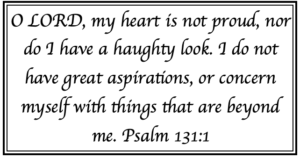 Extracting the marrow of this truth: Jesus is talking about an anxiety built upon imagined necessities—or if the needs are real, imagining our Lord somehow negligent in meeting them—making such a christian doubly ill-content with his or her reality. …and living with longings that faith should be able to meet, emotional waves which faith is well able to calm. Jesus labeled this an example of little faith. [In the biblical language this is one word never used before. Did Jesus invent it?
Extracting the marrow of this truth: Jesus is talking about an anxiety built upon imagined necessities—or if the needs are real, imagining our Lord somehow negligent in meeting them—making such a christian doubly ill-content with his or her reality. …and living with longings that faith should be able to meet, emotional waves which faith is well able to calm. Jesus labeled this an example of little faith. [In the biblical language this is one word never used before. Did Jesus invent it? something someone else has, or, perhaps, something we rationalize we are entitled to have, we are overwrought with a most unreasonable quest for things. Instead of calming this maverick passion or lust through a time of prayer we entertain a growing anxiety—not over what God promises, because He, all along, has proven Himself faithful. We are not at peace within because we have our eyes on circumstances that might deny us “things,” things that have no eternal value and are, therefore, of lesser concern to God once our basic needs are indeed met by Him. Earthly interests are meteors burning up in the atmosphere of a hot passion for the “higher” life. Are they not!?
something someone else has, or, perhaps, something we rationalize we are entitled to have, we are overwrought with a most unreasonable quest for things. Instead of calming this maverick passion or lust through a time of prayer we entertain a growing anxiety—not over what God promises, because He, all along, has proven Himself faithful. We are not at peace within because we have our eyes on circumstances that might deny us “things,” things that have no eternal value and are, therefore, of lesser concern to God once our basic needs are indeed met by Him. Earthly interests are meteors burning up in the atmosphere of a hot passion for the “higher” life. Are they not!?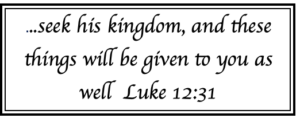 Then in verse 33 Jesus seemed to go too far: Sell your possessions and give to the poor.
Then in verse 33 Jesus seemed to go too far: Sell your possessions and give to the poor.